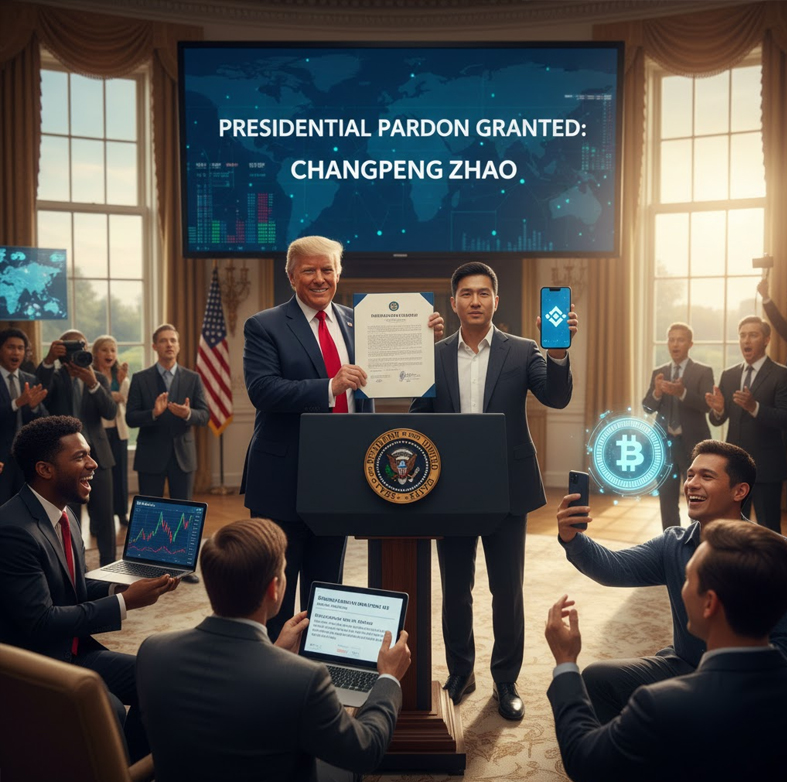Premium Biz Post – In a stunning political and financial twist, Donald Trump Pardons Binance CEO — a phrase that has dominated global headlines since the announcement earlier this week. The decision to grant a presidential pardon to Changpeng “CZ” Zhao, the founder and former CEO of Binance, has sparked heated debate across the financial world. For many, this move symbolizes a seismic shift in how the United States views cryptocurrency, regulation, and the broader digital economy.

The Presidential Pardon That Shook the Industry
On Thursday, President Donald Trump officially granted a full pardon to Changpeng Zhao, who had previously pleaded guilty to violating U.S. anti-money laundering laws. Zhao, one of the most influential figures in the crypto world, had stepped down from his role at Binance in late 2023 after reaching a settlement with the U.S. Department of Justice.
Trump’s decision to pardon Zhao was both unexpected and controversial. The White House statement praised Zhao’s “contributions to digital innovation and the global financial system,” while critics accused the administration of favoring powerful tech elites over justice.
The pardon not only erases Zhao’s legal troubles but also reopens the conversation about the future of crypto regulation in the United States. As the world’s largest cryptocurrency exchange, Binance has faced numerous legal challenges across jurisdictions, with governments questioning its compliance, transparency, and influence over digital finance.
A Polarizing Reaction from the Crypto Community
The reaction from the global crypto community was immediate and intense. Some hailed the decision as a step toward legitimizing the crypto industry, while others warned it could encourage unethical practices and weaken regulatory oversight.
“CZ has been a pioneer, not a criminal,” said one crypto investor on X (formerly Twitter). “He changed how the world views decentralized finance.”
However, others were far less supportive. Financial analysts and blockchain law experts have voiced concern that the pardon undermines ongoing efforts to regulate the digital asset market. “This sends the wrong message,” commented Robert Hayes, a regulatory attorney specializing in fintech compliance. “The U.S. is trying to clean up crypto, not excuse it.”
Read More : ”DIY Aesthetic Room Decoration Create a Cozy Space That Reflects You”
Market Response: Volatility Returns
Following the announcement, Bitcoin’s price surged by 3%, while Binance Coin (BNB) rose more than 8% in less than 24 hours. Traders interpreted the pardon as a sign of renewed confidence in Binance’s leadership and stability.
However, the market response was far from unanimous. Some altcoins dipped as investors sought to rebalance portfolios amid fears of increased scrutiny from regulators abroad.
Economists say this level of volatility was predictable. “Whenever politics intersects with crypto, you can expect emotional reactions from both traders and policymakers,” explained Dr. Lisa Monroe, a professor of digital economics at MIT. “This pardon adds another unpredictable variable to an already turbulent market.”
Trump’s Strategic Move Ahead of 2026 Elections
Many political analysts believe the pardon was a calculated move ahead of the 2026 midterm elections. Trump’s administration has consistently courted the tech and financial sectors, often promising reduced regulation and lower taxes for innovators.
Granting clemency to a high-profile crypto entrepreneur could strengthen his appeal among younger, tech-savvy voters — a demographic that has increasingly aligned with digital asset investments and decentralized technologies.
Political columnist Andrew McCarthy commented, “This wasn’t just about CZ. It’s a message to Silicon Valley and Wall Street: Trump supports the future of digital finance.”
Yet, others argue the move may backfire. Critics have accused Trump of undermining judicial independence and using presidential powers for political gain. Some Democratic lawmakers are already calling for an inquiry into whether Zhao’s pardon involved lobbying or financial influence.
CZ’s Response: Gratitude and Reflection
Shortly after the news broke, Changpeng Zhao issued a statement via X, expressing “deep gratitude” to President Trump and vowing to continue contributing to the crypto ecosystem responsibly.
“I’m truly humbled by this decision,” Zhao wrote. “This is not just about me — it’s about recognizing the value of innovation and financial freedom. I’ll continue to work toward a safer, more transparent digital world.”
Zhao’s tone struck a balance between humility and renewed ambition. While he has not confirmed whether he plans to return to Binance’s leadership, insiders speculate that he could resume a strategic advisory role or even launch a new blockchain-focused venture.
Global Implications: Regulation, Trust, and Power Dynamics
The pardon’s impact extends far beyond U.S. borders. In Europe and Asia, regulators have expressed concern that this decision may embolden crypto exchanges accused of noncompliance. The European Central Bank, in a brief statement, emphasized that “rules and enforcement remain essential for digital market stability.”
Meanwhile, Binance’s global competitors — including Coinbase, Kraken, and OKX — are closely watching developments. A senior executive at one major exchange, speaking anonymously, remarked, “If CZ can get a presidential pardon, it changes how we all perceive accountability in this space.”
In China and Singapore, where crypto regulation remains tight, the news sparked a wave of discussion about government control versus innovation freedom. Some observers see Trump’s move as a geopolitical signal: America is willing to embrace risk in exchange for technological leadership.
A Divided Public Opinion
Among U.S. citizens, the reaction is split. Crypto advocates argue that innovation has always faced resistance from regulators, comparing CZ’s struggles to those of tech pioneers like Elon Musk or Steve Jobs. They believe the pardon represents progress — a recognition that digital currencies are now part of mainstream economics.
However, critics remain skeptical. Consumer advocacy groups warn that deregulation could lead to more scams, money laundering, and investor losses. They point out that Binance’s past controversies — including accusations of enabling illicit transactions — have not been fully resolved.
“Crypto innovation is welcome, but not at the expense of accountability,” said Jennifer Albright, director of the Financial Transparency Coalition. “The pardon risks sending the message that if you’re rich enough, you’re untouchable.”
What’s Next for Binance and the Crypto Market?
With Zhao’s legal record cleared, Binance could attempt to reenter U.S. markets or expand partnerships with traditional financial institutions. Experts believe this could accelerate institutional adoption of digital assets — provided Binance strengthens its compliance infrastructure.
However, questions remain about whether regulators will ease scrutiny or tighten controls. The Securities and Exchange Commission (SEC) and the Commodity Futures Trading Commission (CFTC) are still pursuing several investigations into crypto exchanges over fraud and market manipulation.
Market analyst Kevin Liu predicts that the coming months will be crucial. “If Binance uses this opportunity to demonstrate transparency and ethical leadership, it could regain investor trust. But if the company repeats past mistakes, backlash will be even harsher.”
The Broader Meaning: A Turning Point for Crypto Politics
Ultimately, Trump’s pardon of CZ could mark a turning point in the relationship between politics and digital finance. The decision highlights how cryptocurrency has evolved from a fringe movement into a global economic force with real political influence.
For better or worse, the event underscores that crypto is no longer separate from the mainstream. Governments, corporations, and investors now share the same stage — and every decision, from policy to pardon, can reshape the landscape overnight.
Industry leaders and traders alike are now watching closely to see whether this moment becomes a catalyst for reform or a cautionary tale of power and privilege in the digital age.
The story of Changpeng Zhao’s pardon is more than just a legal twist — it’s a defining moment for the entire cryptocurrency world. Whether this will empower innovation or ignite further controversy, only time will tell. What’s certain is that the crypto market has entered a new era — one where politics, technology, and finance are more intertwined than ever before.



